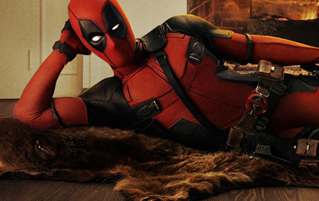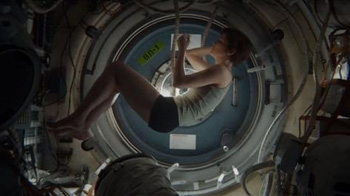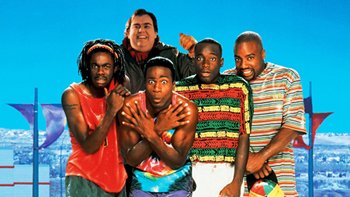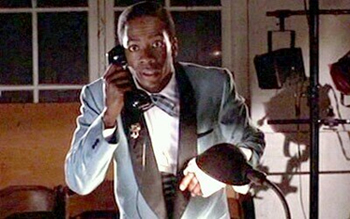8 Absurdly Bad Ideas Studios Almost Forced Into Great Movies

We talk a lot about the lack of originality in Hollywood, but every once in a while, the studios will come across an idea for a truly unique movie or TV show -- something with the potential to be adored by both critics and human beings alike. And in a troubling amount of those instances, the studio's reaction will be, "What the hell is this crap? Change everything about it, please."
Fortunately, not all filmmakers bother listening to the opinions of the incredibly powerful people who make their work possible, and that's why we now have movies and shows like ...
Stranger Things Was Rejected 20 Different Times Because Networks Wanted To Lose The Kids

Hitting just the right amount of Spielbergian '80s nostalgia with Stephen-King-esque fucked-up-ness, Stranger Things rocketed to the top of everyone's Netflix queues. The supernatural mystery, the throwback vibe, and the adorable yet talented cast of child actors formed a recipe for success -- one that was rejected over and over again by people who do this for a living.

Not understanding how a bunch of adults could be interested in a motley gang of spunky children and their otherworldly problems, studio after studio shot down the mega-hit, believing the mixed-aged cast was too confusing for audiences to get behind. Yes, Hollywood thinks everyone must be exactly as narcissistic as them.
Those who were willing to give the show a shot offered to accept the series on one of two conditions: Either make it a children's show, thereby killing the central mystery of the plot, or cut those crazy kids altogether. The show already had a character adults could relate to, the networks thought. Why not make the whole plot revolve around Sheriff Hopper investigating paranormal crimes from week to week? That would work, right?

"And can it be that guy from Californication ... and the lady from Hannibal? I smell a hit!"
The creative team behind the series, the Duffer brothers, held out for a network that would give their show the treatment it deserved, and eventually found a home on Netflix. The series got to keep its plot and cast intact, and we got a great series commercial-free. So, win-win.
The Walking Dead Was Almost A Crime-Of-The-Week Procedural

When The Walking Dead burst on the scene with its slow-burn character development and gruesome zombie kills, the show quickly became a head-smashing success. Viewers would eventually become frustrated with its oft-repeating formula, but it could have been way, way worse. Like, NBC worse.
Let's just say this was almost more than a parody.
At the time the series premiered in 2010, zombies were considered a dying fad, like superheroes or Pokemon. So networks agreed to snatch up the promising script as long as there weren't any of those pesky brain-eating corpses running around. Refusing to allow his zombie comic adaptation to continue without, you know, zombies, series creator Robert Kirkman kept shopping around his script, looking for someone with the guts to leave the horror element intact. (All these puns are totally accidental, incidentally.)
Finally, Kirkman found a home ... at NBC. The Peacock was unafraid of the zombie-centric script, but still had a few ideas of their own. Not content with their already procedural-laden lineup, the network suggested Deputy Sheriff Grimes continue his crimefighting ways after the dawn of the zombie apocalypse. Instead of rounding up deadly survivors and supply thieves, Rick and co. would solve a zombie-related crime every week.

We're betting it wouldn't have taken long before "Huh, this one got eaten by a zombie too -- case closed" got horrifyingly boring. Maybe they could have mixed things up with zombie grand larceny or tax evasion?
Fox Hated Everything About Deadpool, Tried To Make It Family-Friendly

Deadpool was a record-smashing, franchise-birthing success of a movie ... and the studio benefiting from all that, 20th Century Fox, wanted absolutely nothing to do with it. Everyone closely involved with the film wholeheartedly agrees they only got the green light thanks to the famously leaked test footage which went stupidly viral. Even then, Fox's reaction was less "Hey, people like this thing that we own!" and more "Ugh, guess we have to do this now."
When they finally allowed Deadpool to commence filming, Fox originally agreed to an R rating, because duh -- it's a movie about a dick-joke-telling, gore-causing anti-hero. However, they soon got cold feet and insisted the writers rehash their script until they could slap the almighty PG-13 right across its big, dumb, money-making face.

The writers complied, but star Ryan Reynolds put up such a passionate (and public) fight that the studio eventually caved for good, allowing the original R-rated script to move forward ... for as little money as possible.
Clearly still reeling from the millions of preteen dollars sacrificed by the grown-up script, Fox decided to cut their losses, right along with the film's budget, to the tune of $7 million. Right at the beginning of shooting. The crew had to scramble to find adjust their sudden lack of money while preserving the action they felt was necessary to the plot. So mansions are only ever seen from the front doorstep, and the guns are forgotten right before the Big Epic Battle, all while Deadpool snarks about how very inexpensive this all is.

After yo-yoing the ratings and screwing with the budget, Fox had one more request to make, but it was a doozy. They wanted the movie to be linear. Meaning that, instead of being a fun action romp with manageable doses of darkness and sadness peppered throughout (the flashbacks), this would have been a downer movie about a guy who gets cancer, gets tortured, stalks his girlfriend for a while, and finally descends into dick jokes and revenge. Fortunately, the studio reconsidered, presumably after Deadpool himself leapt out of a screen and threatened to shoot them in the balls.
Gravity's Studio Wanted To Add A Romantic Subplot, A Villain, And Every Cliche Possible

Alfonso Cuaron, director of the acclaimed astronaut drama Gravity, does not have a problem with studio executives. Cuaron understands that it's tough to wait years on end to see the results of millions of invested dollars. Cuaron knows all their suggestions are well-intended. He simply doesn't give a shit.
According to the director himself, whenever executives got a little too antsy waiting for updates to come out of the Gravity shoot, a cornucopia of idea vomit would come spewing forth like a geyser of bad movie tropes. "Cut to Mission Control a lot!" they said. "Can Sandra Bullock's character be in love with the Mission Control Commander?" they said. "Can we have an enemy? Like a missile strike?" Never mind that there was no logical explanation for said enemy. Some hapless Mission Control noob leaned on the wrong button, perhaps? Where there's stupid, Hollywood will find a way.

But Cuaron had a vision. All he wanted to make was a goddamn movie about astronauts trying to fall back to Earth without burning up, and those silly cliches had nothing to do with that. So he ignored the daily barrage of studio notes and went about making his movie the way he intended: basic, tense, emotional, and with precisely the right amount of Clooney face.

The result: seven freaking Oscars. Hope Cuaron remembered to thank the executives in his speeches.
Harry Potter Was Almost American (And Animated)

One of the most popular book series to come out of Britain in the past ... ever, Harry Potter was destined to bask in the glorious pedigree of its British actors and locations. Warner Brothers, naturally, fought this every step of the way. The studio wanted to Americanize the material to maximize profits on their home soil. Because kids couldn't possibly be expected to focus on the tale of a powerful wizard child and his magical friends when strange and foreign phrases such as "blimey" and "smashing" came flying out of their mouths.

J.K. Rowling wasn't exactly thrilled ... but still, a hamfisted love letter to America is hard to pass up when goddamn Stephen Spielberg wants to direct the film version of your books. Unless, that is, Steve wants to mash a bunch of those books together into one animated abomination starring that punk Sixth Sense kid. Then you pass on it hard.

Though a Bewitched-style title sequence would have been kinda neat.
And pass Rowling did. Thanks to her artistic integrity, the series was able to retain its British charm, and the world was introduced to Daniel Radcliffe, Emma Watson, and, you know, others. Meanwhile, Spielberg took his obsession with Osment with him to film A.I., which was the last major movie the poor kid ever really starred in. Bloody hell.
Disney Wanted To Cut The Jamaican Accents In Cool Runnings

In 1993, after buying the best screenplay on the subject that heroin addiction can produce, Disney set out to tell the tale of a scrappy team of underdog Jamaican bobsledders on their journey to the Olympics. Jamaicans, you might have noticed, often have Jamaican accents, so you might expect the characters in the movie to have them as well. If so, you're apparently not equipped to work as a big shot at Disney.

"Let's have John Candy dub everyone's voice."
Two of the movie's actors had extensive exposure to authentic Jamaican accents -- one through his work in reggae music and the other from being half-Jamaican and listening to his dad talk all day. The two would deliver their lines flawlessly, perfectly portraying the nationality of the characters they were hired to play. Disney, of course, did not approve of this. After hearing them, the studio would call up the actors and tell them to try being less accurate and lose the accent. But not all the way. Make it like Aladdin!
Seeing through Disney's blatant racism, the actors decided to keep the accents, but compromised by making them a bit less pronounced. It's a miracle they didn't turn the damn bobsleds into giggle-powered candyfloss chariots invented by Gyro Gearloose and Gadget the mouse.
Blade Runner Made The Studio Absolutely Furious

Ridley Scott's science fiction thriller swam some murky waters, to be sure. Was Deckard a replicant? What does it mean to be human? Do robots dream of electric sheep? Existential questions such as these were no bother to Tandem Productions Incorporated when they screened Blade Runner in 1981. What plagued the studio instead were mysteries like, "Why does everyone take so long to enter buildings?" "Why is the voiceover so bad?" "Where is the Vangelis music?" "Why is the voiceover bad?" "More tits?" "Why is the voiceover so bad?"

Aside from the frequently vague critiques about the movie being dull, confusing, and overall not good, the executives spent the most of their time hating the voiceover -- a thing they had insisted on adding in the first place, against Scott's wishes. They hated it so much that it moved them to wonder if the actor -- nay, the entire crew -- were high as a kite during filming.

On this set? No way.
Scott was happy to drop the voiceover ... until the execs went, "Hey, you know what this movie needs? A voiceover." According to Harrison Ford, everyone had agreed the best version of the film was sans narrator, but at some point, the studio had a change of heart and demanded the voiceover be put back in. Ford was forced to perform the narration against his better judgement, which angered him deeply. You can guess how that will affect the plot of the sequel.
Back To The Future Could Have Been Called Space Man From Pluto

Back To The Future was a monster hit which smashed barriers to combine teen comedy, action/adventure, time travel, and a pinch of incest. You would think such a broad variety of themes would have protected the film from being labeled a "genre" stereotype, but that's exactly what Universal Pictures president Sid Sheinberg was sure the flick would be seen as.
His solution? Renaming the movie Space Man From Pluto. A title you may recognize as being 1) not at all related to the premise of the movie, 2) distinctly "genre," and 3) dumb as fuck.

Despite those small details, Sheinberg had a plan for how to justify the name: Shoehorn those words into the script wherever possible. The scene in which Marty visits his sleeping father to deliver a message as Darth Vader from the planet Vulcan? Now Marty's a spaceman from the planet Pluto. George McFly's sci-fi book series? Call it Space Man From Pluto. Random bits of dialogue where people call Marty things other than "space man from Pluto"? Make it so they call him "space man from Pluto" (for some reason). It's brilliant! And should anyone notice that the new name does indeed sound like a hack sci-fi flick title, pshaw! Sheinberg feels differently, and that should be enough.

Thankfully, Spielberg and Robert Zemeckis ignored the idea. (Spielberg went one further and thanked Sheinberg for such a rip-roaring "joke memo.") We're guessing Sheinberg is still suggesting the same title to every period drama, sports movie, and Truman Capote biopic he comes across, but no one's bitten yet. One day, Sid.
Carolyn sometimes tweets about movies on Twitter.
Last Halloween, the Cracked Podcast creeped you out with tales of ghost ships, mysteriously dead people, and a man from one of the most famous paintings in U.S. history who years later went all Jack Nicholson in The Shining on his family. This October, Jack and the Cracked staff are back with special guest comedians Ryan Singer, Eric Lampaert, and Anna Seregina to share more unsettling and unexplained true tales of death, disappearance, and the great beyond. Get your tickets for this LIVE podcast here!
Also check out 6 Famously Terrible Movies That Were Almost Awesome and 5 Famously Terrible Movies That Were Almost Great.
Subscribe to our YouTube channel, and check out 8 Great Movies With Insane Deleted Scenes, and other videos you won't see on the site!
Follow us on Facebook, and give us a big hug, please.